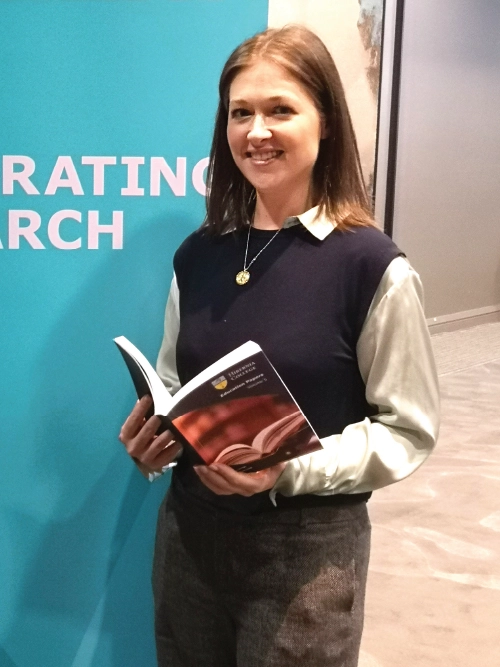
Research profile
Sarah Joyce
PME in Post-Primary Education
As a language teacher, Sarah is drawn to language pedagogies and the teaching methodology of code-switching.
Research Paper Title
An Integrative Literature Review Exploring the Use of Differing Socioeconomic Linguistic Codes as an Effective Differential Tool Aimed at Alleviating Socioeconomic Educational Inequality
Abstract
Bernstein’s linguistic code theory purports that differing linguistic styles develop in children in direct response to their socioeconomic backgrounds. Curricula and assessment methods that are tailored towards the elaborate linguistic style of higher socioeconomic demographics can result in an unequal access to education (Davies et al., 2004). This dissertation investigated the application of teaching methodologies to a socioeconomically diverse classroom context that differentiates for varying linguistic codes. The study found that the elaborate linguistic code can be treated as a specialised academic language and thus can be taught as a separate language. A significant pitfall identified relates to assimilation along with conflicting effects between the restricted code used at home and the academic code required for academic achievement. This impacts learner self-efficacy and students’ sense of identity, especially those from low socioeconomic backgrounds.
Biography
Sarah Joyce completed the Professional Master of Education (PME) in Post-Primary Education at Hibernia College in 2021. Prior to this, she graduated with a Bachelor of Arts (Hons) Degree in Modern Irish and History from University College Dublin and a Postgraduate Diploma in Law from Dublin Institute of Technology. Sarah recently completed her NQT year, teaching Gaeilge at a secondary school in Co. Wicklow. As a language teacher, she was drawn to language pedagogies and the teaching methodology of code-switching. This inspired her to conduct research on whether this teaching methodology could be applied to Bernstein’s Linguistic Code Theory insofar as a teacher could use the codes of varying socioeconomic factions to differentiate for the classroom to achieve a more inclusive learning experience.
Research motivation
Can you tell us a bit about your research project?
My research examined whether the language teaching methodology of ‘Code-Switching’ could be applied to Bernstein’s Linguistic Code Theory insofar as a teacher could use the linguistic codes of varying socioeconomic factions in an effort to differentiate their classroom and ultimately achieve a more inclusive learning experience.
What motivated you to undertake this research?
The premise for my research project originated from my study of the sociology of education, and in particular, Basil Bernstein’s Linguistic Code Theory. As a language teacher, I was drawn to language pedagogies and teaching methodologies and I came across the teaching strategy, ‘code-switching’, whereby the teacher moves between the students’ first language and the language being taught. The aim and motivation of the research was to explore whether this teaching methodology could be applied to the Irish classroom with the view to differentiate for various socioeconomic backgrounds through the use of linguistic codes and ultimately, reduce educational inequality on socioeconomic grounds.
What impact has it had on your practice?
The research found that the academic language of the education system can be viewed as a vehicle for cultural reproduction and provided an insight into how language can be used for socioeconomic differentiation. The research also highlighted the effects that the conflict between a restricted code used at home and the academic code required for educational success can have on the self-efficacy, sense of identity and confidence of students from low socioeconomic backgrounds. A distinction was therefore made between differentiation and assimilation. As a teacher, the research has encouraged me to approach the concept of academic language in a holistic and socio-cultural manner and taught me the importance of teaching the academic code and the skill of codeswitching in a manner which still respects and validates the linguistic codes of all students in the classroom.
How important do you feel research will be in your future practice?
Research will play an important role in my future practice. Engagement with research provides educators with an opportunity for continuous professional development. As teaching methodologies develop, and as society evolves and diversifies it is imperative that educators remain abreast of how best they can teach while also ensuring that their classroom represents a safe and inclusive space for all students.